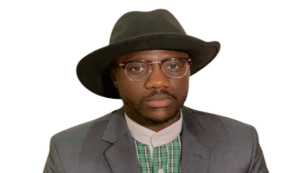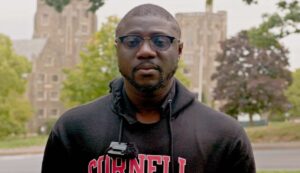US: Thousands of students across the US took part in pro-Palestinian demonstrations, urging their schools to
US: In the midst of Israel’s continuing conflict in Gaza, thousands of students around the United States have taken part in pro-Palestinian protests calling on their colleges to divest from corporations providing weapons to Israel.

While the majority are residents of the United States, Momodou Taal, a 30-year-old British national pursuing a PhD at Cornell University, may have to leave the nation as a result.
A third-year doctoral candidate in Africana studies who also teaches “What is Blackness?,” a first-year writing class. Taal is enrolled at Cornell University in Ithaca, New York, on an F-1 student visa, studying “Race and Processes of Racialization.”
In the spring, he was one of four Cornell students punished for taking part in a pro-Palestinian camping on campus. Regarding a protest on September 18, the university notified Taal of a second “temporary suspension” on Monday.
Taal claims he is “effectively” facing deportation since he was informed by university authorities that his F-1 visa will be canceled as a result of the most recent suspension.
Taal and other foreign students who have participated in pro-Palestinian marches had to deal with the disturbing possibility ever since these gatherings became widespread in the spring and colleges began to clamp down.
WATCH THIS
Update:
The VP of student and campus life, Ryan Lombardi, rejected my appeal after one business day. This demonstrates once again that my ability to stay in this country is being hastily handled without due process in a continued attempt to silence me.
I have until 5pm…
— Momodou ✊🏿 (@MomodouTaal) September 26, 2024
In order to prevent similar disturbances this semester, colleges have subsequently implemented security protocols and protest standards, and the makeshift camps made of tents that were visible on several campuses during the spring have not reappeared. Students are still protesting despite the growing number of deaths in Gaza. However, there haven’t been any documented cases of an overseas student getting kicked out of the nation as a result of it up until now.
Taal said that he believes Cornell has singled him out for punishment in an effort to put a stop to student demonstrations. “They want to make an example, a loud example, so it will scare other students not to be involved in pro-Palestinian organizing,” he said to Newsweek.
Joel M. Malina, vice president of university relations, provided Newsweek with a response via a university spokeswoman. “International students attending college in the U.S. on F-1 visas are obligated to comply with federal requirements to maintain their visa status,” Malina said. One of the federal criteria is to continue being a registered student full-time.
“Any student who is not allowed to be enrolled due to a disciplinary action must have their F-1 status terminated by the university, per federal regulation,” Malina said. “Immediate evaluation of immigration standards and professional consultation are advised for any foreign student who has been administratively removed by Cornell due to violations of the Student Code of Conduct. Universities do not have the authority to deport students, although they may refuse admission and ban students from the school.”
In response, Taal said, “But isn’t that just semantics? I’ve requested another word from them about ordering someone to leave the nation against their will.”
A statement from Michael I. Kotlikoff, Cornell’s interim president, was sent to Newsweek by the university spokeswoman. It claimed that the demonstrators had engaged in “intentionally menacing behavior” during the September 18 demonstration that forced the closure of a job fair at the Statler Hotel on campus.

“The demonstrators forcibly entered the hotel by pushing aside Cornell Police Officers,” stated Kotlikoff. He said that when they entered the hotel’s ballroom, “an officer’s body-worn camera” was pulled off, and that from then, their usage of pots and pans, cymbals, and bullhorns “resulted in medical complaints of potential hearing loss.”
Those who entered the hotel, according to Kotlikoff, would “face immediate suspension or employment sanctions up to and including dismissal.” When asked if there were any other students receiving disciplinary action than Taal, a Cornell representative said that they “don’t have additional information to share.”
Taal denied any involvement in acts of violence against law enforcement personnel. The Cornell Sun, the student newspaper for the institution, said that none of its reporters who were on the site saw anybody physically harm police officers.
Taal claimed that on September 18, he had made a brief speech outside the hotel as part of the demonstration led by the Coalition for Mutual Liberation, a group of students demanding that Cornell pull out of business dealings with “any company complicit in genocide, apartheid, or systematic cruelty against children perpetrated against Palestinians.
” He said that since Boeing and L3Harris, two companies that produce weaponry for the Israeli military, were present at the exhibition, the demonstrators subsequently caused disruptions.
Taal said that before the fair was closed, he had only been inside the hotel for perhaps five minutes. On his way out of the campsite earlier this year, he said that Cornell University Police Chief Anthony Bellamy had recognized him.
“He kind of made a funny sound at me, and then I just carried on walking,” stated the man. “The next day, I received an email saying that he has reported me.”
Bellamy has been emailed by the Cornell University Police Department (CUPD) for comment.
Taal “repeatedly failed to comply with the lawful directives of university officials to back away” from the entrances of the Statler Hotel and a ballroom inside, according to the police complaint against him, which Newsweek reviewed. Taal is accused of violating the university’s code of conduct.
It further alleges that he engaged in “unauthorized use of university property by entering the hotel immediately behind individuals who had used force to gain entry” and that once he was inside, he “intentionally led or repeated chants that were unreasonably loud resulting in the significant disruption of university activities.”
Taal was subsequently “temporarily suspended” by the OSCCS, and for the period of the temporary suspension, a “persona non grata” will be imposed, barring him from campus, according to a letter that Newsweek also examined.
Taal said that at a meeting on Monday, an official from the institution informed him that his withdrawal would soon become official and that he would then lose his F-1 visa status. The official then instructed Taal to get in touch with the senior immigration counsel at the university.
In an email that Newsweek obtained, the advisor informed Taal that “we must close your F-1 record on the effective date of your suspension and discontinuation from your program” and that there would be “no grace period for your departure” from the United States beyond that date.
“You should leave either before the end date of your F-1 record or right away after the record is closed,” the lawyer said. “If you wish to remain in the U.S. on a tourist visa, then you must seek legal advice from a licensed immigration attorney on how to apply for a change of status.”
Taal wants Cornell to investigate the claims made against him, give him a fair trial, and follow its own regulations. He says he is “trying to fight” and has hired an attorney.
Students who are temporarily suspended from Cornell University are allowed to submit a written request to the University Hearing and Review Board to have their suspension lifted. The request must be submitted within five business days, and it will be considered by three board members: a student, a faculty member, and a nonfaculty person. The temporary suspension may be promptly removed if the panel finds that the reason for it was “inadequate or absent” or that the situation has altered to the point where it is no longer required.
Staff, students, and others have united in support of Taal.
On Wednesday, students demonstrated in favor of Taal, and at least 7,000 people have signed an open letter calling for Taal to be let back into the classroom.
“This is the first time a Cornell graduate worker is facing immediate deportation without administrative due process or the ability to review evidence of their alleged misconduct,” it reads. “Unless we stand up to the university, it is entirely plausible that at any moment, Momodou will have less than a 48 hours notice to book a flight, pack up all of his belongings, and get out of the country.”
In an opinion piece published in the Cornell Sun on Wednesday, the Cornell Chapter of the American Association of University Professors demanded that the university lift Taal’s temporary suspension, claiming that the administration’s “unjust and unjustified response to the protests violates academic freedom and freedom of expression.”
Cornell’s senior administrators were urged on Friday by the editorial board of the student newspaper “to go back to square one, reevaluate their biases, provide due process and reverse this specific targeted, unjust and possibly illegal suspension.”
Taal announced via social media on Thursday that, after only one day, vice president of student and campus life Ryan Lombardi had denied his appeal of his interim suspension.
“This demonstrates once again that my ability to stay in this country is being hastily handled without due process in a continued attempt to silence me,” he said on X, which used to be Twitter.
“I may appeal to the provost until Friday at 5 p.m. I understand that my withdrawal will be handled and that I will have to leave the country right once if the provost rejects my appeal.”
“Once again, there has been no investigation, and I haven’t even had a chance to address the accusations made against me,” he said. I firmly believe that everything I have done has been nonviolent and compliant with my First Amendment rights.
This is a purposeful attack on a Black Muslim kid at a school where those two identities are becoming less and less accepted. To further its business interests, the institution will break its pledges to academic freedom and free expression when it comes to Palestine.”
In a statement released on Thursday, Taal’s lawyer Eric Lee said that Taal had been misinformed by Cornell administration that he needed to be ready to leave the country by the weekend.
“Federal immigration regulations, however, do not require universities report changes in a student’s status until several weeks later,” Lee said. “Mr. Taal would not have had the right to a hearing or the chance to refute the accusations made against him if Cornell had not threatened to report him.”
“Knowing full well that doing so will subject him to serious immigration consequences,” Lee said, Cornell chose “to persecute Mr. Taal for free speech activity.” “By proceeding in this way, Cornell’s administration is setting a dangerous national precedent and risks destroying its long-standing reputation as a center of free speech.”
According to Taal’s statement to Newsweek, the Cornell Africana Studies and Research Center came into being during a 36-hour student occupation of Willard Straight Hall in 1969.
“That’s my department, and Cornell loves to honor that history. However, when pupils pretend to say similar things, “you know what? They will hit us hard right now, but I’m sure they’ll attempt to celebrate it later. This is the problem of the day, and we’re protesting and demonstrating unity.”
Taal said that if he is eventually compelled to leave the United States, his life would be completely upended.
He still doesn’t regret taking part in the demonstrations.
“The daily horrors that we see, knowing my school has complicity with weapons manufacturers… knowing that students’ money is going toward that, I think any human being of conscience would be moved by what they see,” he said.
“It’s important to note that this issue is never divorced from Palestine,” he stated, thanking his supporters. Other causes, in my opinion, wouldn’t experience as much tyranny.”